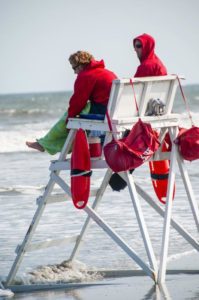Who is a member?
Our members are the local governments of Massachusetts and their elected and appointed leadership.

Municipalities must consider numerous safety concerns when hiring seasonal help such as lifeguards.
Each summer, municipalities across the state hire seasonal employees to meet increased demand for a variety of jobs. Although temporary in nature, this spike in employment requires careful consideration to avoid safety and liability exposure.
Seasonal hires are often high school and college students who, depending on their age, may be subject to child labor laws. Further, all minors under the age of 18 must complete an employment permit application and get their permit before starting a new job. (A youth employment permit is available online.)
Under child labor laws, workers between the ages of 14 and 16 shall not, among other things:
• Operate, clean or repair power-driven machinery (except office machines or machines for retail cleanup, or kitchen work not otherwise prohibited)
• Work on or use ladders, scaffolds, or their substitutes
• Work in garages, except dispensing gas and oil
• Ride in or on a motor vehicle (except in passenger seat when wearing a seatbelt)
In addition, individuals under the age of 16 are allowed to work only between the hours of 7 a.m. and 9 p.m. from July 1 through Labor Day.
Summer hazards
Outdoor summer work increases the potential for common ailments and harms such as heat stroke, dehydration, sunburn, poison ivy, and even lightning strike. It should also be noted that the northeast region of the country has a high rate of Lyme disease (spread by a bite from an infected tick), according to the U.S. Centers for Disease Control and Prevention.
Other potentially hazardous situations include municipal pools and beaches, as well as public works and school jobs that involve working around motorized vehicles and mechanical equipment.
While COVID-19 is still present, municipalities should consider vaccination status and a person’s potential interaction with others, particularly vulnerable populations.
Pre-screen, train and supervise
The three most important things that a municipality can do to help mitigate risks associated with hiring seasonal workers are to pre-screen, train and supervise.
Pre-screen: All camp staff and volunteers at “recreational camps” (as defined by Ch. 111, Sect. 127A and 105 CMR 430.000) must undergo Sex Offender Registry Information (SORI) checks. Although not mandatory, the Sex Offender Registry Board states that a SORI check may be requested “for the protection of a child under the age of 18 or another person for whom such inquirer has responsibility, care or custody.” This latter opportunity may apply to seasonal employees in departments such as parks and recreation or elder services.
Driving records should be thoroughly checked for any employee operating a vehicle to ensure that proper and relevant certifications are in place and valid — such as auto and equipment operator’s licenses, lifeguard certifications, first aid, and CPR.
Pre-employment physicals may also be necessary for certain jobs.
Train: All seasonal employees must be trained properly and thoroughly. Employers must ensure that all employees know how to use equipment and appropriate personal protective equipment competently and safely.
Temporary employees should be included in any tailgate safety talks that are being offered to full-time workers. Seasonal workers must be trained to know what to do in case of an emergency, such as when an injury or property damage occurs, or when inclement weather or an electrical storm hits. Employers should review safety manuals and instructions, including listing what equipment each employee is and isn’t authorized to use.
Seasonal employees must sign to verify that they have received and reviewed the information.
Supervise: Do not, under any circumstance, leave seasonal workers unsupervised, as significant and catastrophic injuries could occur. A full-time, adult employee should always be present and supervising part-time summer workers. This can help prevent horseplay and serious injuries.
Risk reduction
Municipal employers should also examine what can be done on a more detailed level and work to address any potential risks. For example, assess the implications of child labor laws (as addressed above). Massachusetts has specific regulations regarding minors and various mechanical equipment, hazardous materials and specific working conditions. For example, employees under 18 years of age may not operate vehicles or forklifts, use buffing or polishing equipment, or work in wrecking, demolition, excavation or roofing.
Employers should carefully examine safety around the city or town and in specific areas where employees will be working. Check parks and playground equipment, and be diligent about pool and beach safety. Remind employees about summer storm and lightning safety, and work with them to identify heat stress and dehydration quickly when it occurs. Ensure that all employees know to report hazardous conditions promptly.
Finally, provide sunscreen for outdoor workers and be prepared for insect bites, poison ivy, sunburn and ticks.
Many municipal departments and the young people they hire are excited about the chance to work together to make a difference in their community. The benefits to both the employer and employee can be great, so long as safety is the first consideration.
Related resources
Wage and child labor laws
• Massachusetts Office of the Attorney General, Fair Labor Division: 617-727-3465
• Massachusetts laws regulating minors’ work hours
• Youth Employment Permit Information
Health and safety
• U.S. Department of Labor, Occupational Safety and Health Administration: Methuen office, 617-565-8810; Braintree office, 617-565-6924; Springfield office, 413-785-0123
• Massachusetts Department of Public Health, Occupational Health Surveillance Program: 617-624-5632
• Massachusetts Department of Industrial Accidents: 800-323-3249, ext. 470
Written by Lin Chabra, MIIA Senior Manager of Risk Management